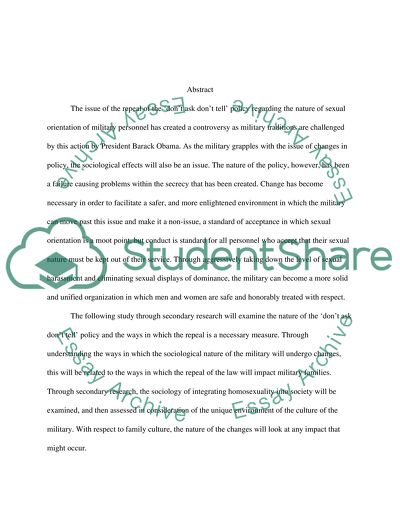Cite this document
(“The Impact of the Repeal of Dont Ask Dont Tell Policies Research Paper”, n.d.)
The Impact of the Repeal of Dont Ask Dont Tell Policies Research Paper. Retrieved from https://studentshare.org/social-science/1577429-what-impact-will-the-department-of-defenses-dont-ask-dont-tell-dadt-repeal-policy-have-on-military-personnel-and-their-families
The Impact of the Repeal of Dont Ask Dont Tell Policies Research Paper. Retrieved from https://studentshare.org/social-science/1577429-what-impact-will-the-department-of-defenses-dont-ask-dont-tell-dadt-repeal-policy-have-on-military-personnel-and-their-families
(The Impact of the Repeal of Dont Ask Dont Tell Policies Research Paper)
The Impact of the Repeal of Dont Ask Dont Tell Policies Research Paper. https://studentshare.org/social-science/1577429-what-impact-will-the-department-of-defenses-dont-ask-dont-tell-dadt-repeal-policy-have-on-military-personnel-and-their-families.
The Impact of the Repeal of Dont Ask Dont Tell Policies Research Paper. https://studentshare.org/social-science/1577429-what-impact-will-the-department-of-defenses-dont-ask-dont-tell-dadt-repeal-policy-have-on-military-personnel-and-their-families.
“The Impact of the Repeal of Dont Ask Dont Tell Policies Research Paper”, n.d. https://studentshare.org/social-science/1577429-what-impact-will-the-department-of-defenses-dont-ask-dont-tell-dadt-repeal-policy-have-on-military-personnel-and-their-families.


